
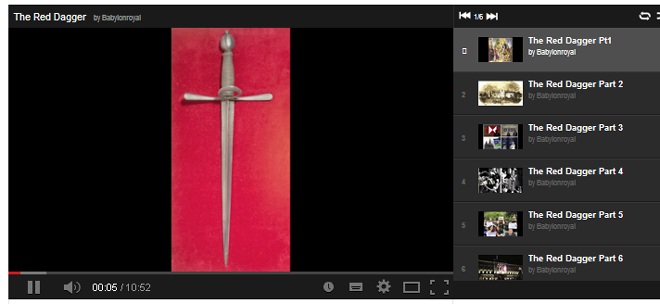 Video and Narration: Alan Cox
Video and Narration: Alan Cox
The Red Dagger in Six Parts
Part 1
http://youtu.be/SCAiqSRofGY
Part 2
http://youtu.be/GquSEt3kPcs
Part 3
http://youtu.be/SPZWwatgLH8
*
“One of the greatest insurrections on English soil,” [1]
H. Fagan, ‘Nine Days that shook England’
“Wat Tyler, John Ball and the leaders of the county risings were the first ordinary men in the British Isles to mount a credible attack on the political and economic structures of their day […] the rebels of 1381 succeeded in giving a voice to those who had hitherto lacked any means of expressing their common political grievances.” [2]
Alastair Dunn, ‘The Peasants’ Revolt’
“We ry shame on the feudal baron who forbade the peasant to turn a clod of earth unless he surrendered to his lord a fourth of his crop. We call those the barbarous times. But if the forms have changed, the relations have remained the same, and the worker is forced, under the name of free contract, to accept feudal obligations. For, turn where he will, he can find no better conditions. Everything has become private property, and he must accept, or die of hunger.”
Peter Kropotkin, ‘The Conquest of Bread’ [3]
“At the foundation of every great fortune lies a great crime.”
Leo Tolstoy (referring to the ownership of common land as robbery)
“Today, humanity faces a stark choice: save the planet and ditch capitalism, or save capitalism and ditch the planet.”
Fawzi Ibrahim
London’s symbol for the hub of global finance in the City
(Shown on the City’s flag to convey heraldic grandeur),
Comes from a blood soaked dagger that killed the rebel, Wat Tyler,
For Tyler had challenged London on behalf of the poor.
The dagger survives and is on display in Fishmonger’s Hall,
In the City’s secretive mini-state within a state
And, like a trophy, its red silhouette is on the City’s coat-of-arms –
As if Tyler’s murder were something to celebrate. [4]
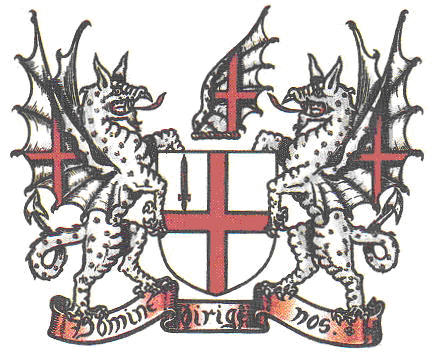
But the hundred thousand marching on London in 1381
Were serfs objecting to being kept as virtual slaves
By the feudal equivalent of corporate power, whereby people
Were caught, and taxed to death just for being alive –
A hundred thousand of those on whose exploitation
The wealth of a feudal society depended:
From ploughmen, to carpenters, to cowmen, to sheepshearers…
Trapped by a bondage that only death ended.
Medieval illustration of men harvesting wheat with reaping-hooks,
on a calendar page for August. Queen Mary’s Psalter (Ms. Royal 2. B. VII),
So their spokesman, Wat Tyler, demanded equality,
“All men should be free and of one condition.”
“We will be free forever, our heirs and our lands.”
But instead of sympathy he aroused suspicion.
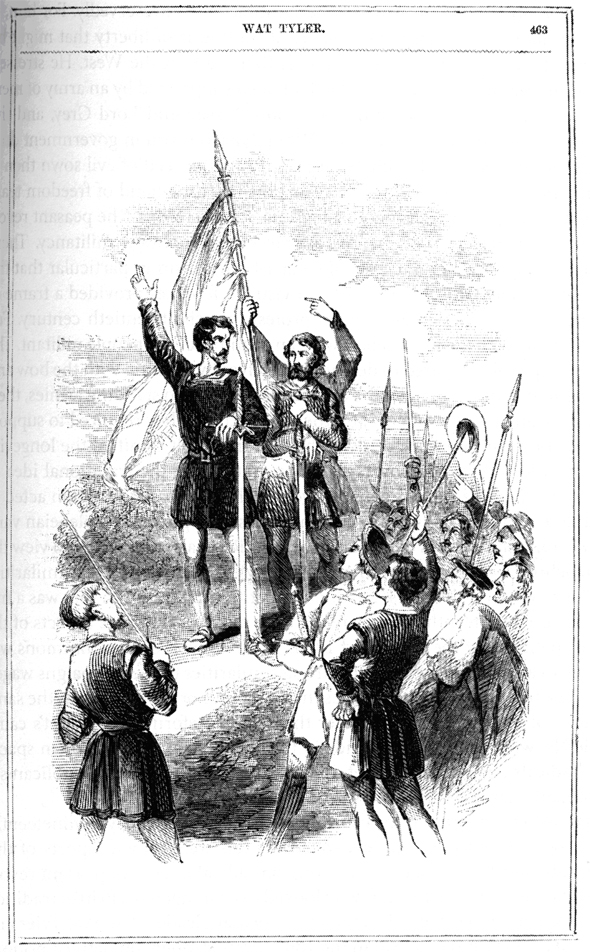
A portrait of Wat Tyler by William Blake
Wat Tyler would rock England’s power elite to the core
Through his opposition to the Statute of Laborers:
A law which kept freeborn Englishmen tied to landlords
Whom Tyler exposed as procurers and plunderers.
The Statute laid down a maximum wage employers
Needed to pay their workers, already reduced
By poll taxes levied on every man, woman and child
In an insidious system of systematic abuse.
Since the Black Death, the population had been halved
And so the work force began deserting its feudal cage,
But an upper and middle class Parliament felt threatened;
By their agricultural slaves demanding a living wage. [5]
The peasants (or ‘villeins’) this cruel Statute declared,
“Do menace their lords in life and member,
And gather themselves in great routs and agree
By such confederacy that one should aid the other.” [6]
Therefore laborers were forbidden to withdraw their labor,
Or even to discuss their conditions –
Combining together to ask for better wages was now illegal,
And if you escaped your feudal lord you faced prison.
In his poem Piers Ploughman, the poet William Langland
Depicted life for manual workers who were landless:
“…They curse the King and all the King’s Justices
For making laws to grieve laborers.” They’d no rest.
On May 30th 1381 an insurrection was kindled in Brentwood;
Essex villages were refusing to make poll tax returns
So Royal Poll Tax Commissioners, backed by soldiers, were sent to inquire
After their subjects’ impudent lack of concern.
The unexpected result was that royal clerks and soldiers
Were ejected from half a dozen villages,
As hundreds of poll tax defaulters bonded together to fight
What they regarded as state sanctioned pillage.
England’s villagers were tired of working morning till night
For the benefit of the Lord of the Manor;
Unable to buy or sell, move or marry, or grind their own corn
Without fines and fees and permission from the master.
Medieval landlords would calculate the minimum diet,
The least amount of beans, and gruel and oats –
The minimum calorific requirements to keep a peasant productive
And landlords would cynically compare notes.
These reactionary cabals of landowning courtiers
Had those they depended upon living in grime;
And all thoughts of improving the lives of their peasants
Was regarded as disruptive, if not a crime.
But villagers, now unimpressed by the Commissioners’ status.
Took to seizing them: one was Chief Justice of the Common Pleas,
Sir Robert Belknape was made to swear on the Bible that he’d never take part
In any further oppression and then released.
Yet the Poll Tax Commissioners persisted in their bullying:
And although children under sixteen were excused,
Invasive searches were conducted and any signs of pubic hair
Meant that the despised tax could be imposed. [7]
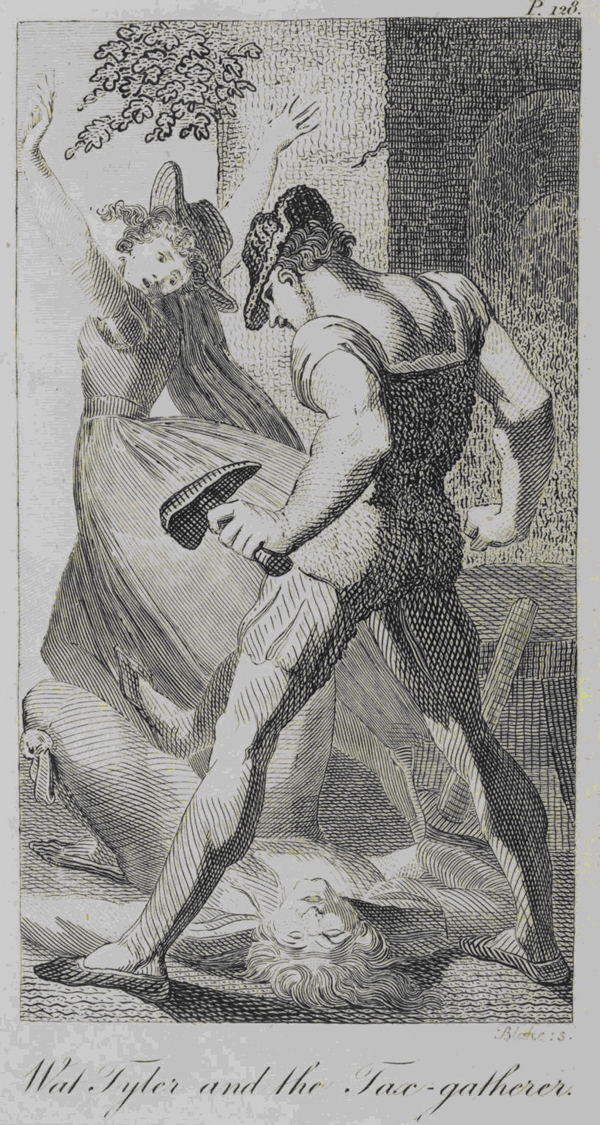 Engraving: William Blake, ‘Wat Tyler and the Tax-Gatherer’
Engraving: William Blake, ‘Wat Tyler and the Tax-Gatherer’
Wat Tyler’s “Saxon grit” in striking a royal tax gatherer
Was celebrated in a popular song, and his renown
Spread for his saying, “our life shall not be by the king’s permit”
“By breaking a head,” the song ran, “Tyler made a hole in the crown.” [8]
In the village of Fobbing, the tax collector was met
By the inhabitants brandishing longbows and axes.
The people of Fobbing would only pay him with arrows
Instead of their coins of the realm for royal taxes.
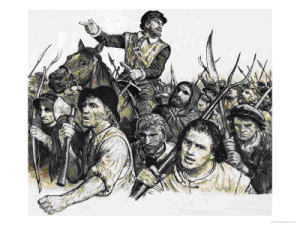
The rebellion grew quickly with more tax collectors attacked,
Then shifted to Kent where Maidstone Castle was torched.
With Wat Tyler elected leader, the rebels took Rochester Castle
Before heading for the power-base of a land-owning Church.
 The Peasants Revolt – © C.L. Doughty / Bridgeman Art Library
The Peasants Revolt – © C.L. Doughty / Bridgeman Art Library
Despite now gathering support from several thousand,
Tyler knew that the rising was lacking John Ball,
So he stormed Maidstone Jail to release the mendicant priest,
Locked up for preaching a radical revolution for all.
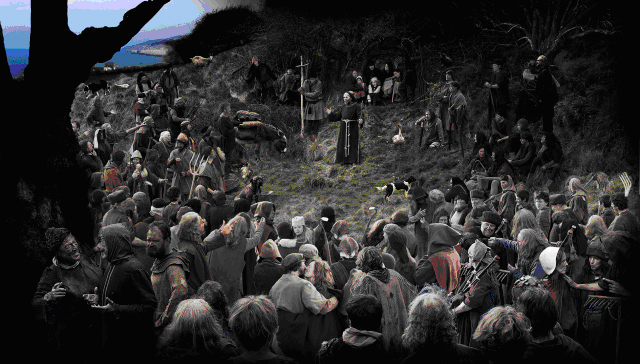 John Ball Hedgerow Priest 1380 Red Saunders
John Ball Hedgerow Priest 1380 Red Saunders
The Church was the major economic power in England
It owned a third of the land: forests and mines,
Fisheries, and rights of pasture, and it charged cruel rents.
John Ball accused it of economic crimes.
When the Abbott of Burton brutally told his serfs
That they “owned nothing but their bellies”.
Ball said “We are formed in Christ’s likeness, and they treat us like beasts!” [9]
Berating such ecclesiastical Machiavellis.
“In the beginning all men were created equal,” Ball said,
“The servitude of man to man was introduced
“By the unjust dealings of the wicked and contrary to God’s will.”
Then he’d describe how natural justice was traduced.
“For if God had intended some to be serfs and others lords.
He would have made a distinction at the beginning.
Now, like a good husbandman tilling his field and uprooting the weeds
That destroy the grain, they should kill the great lords of the kingdom.”
He’d prescribe the same medicine for “the judges and lawyers”
“When the great ones have been cut off,” Ball glowered,
“All men would enjoy equal freedom.
All would have the same nobility, rank and power.” [10]
Ball had no parish but instead stood in churchyards
Denouncing “the dragon of exploitation”.
Railing against the bishops’ and abbots’ luxurious living
He envisioned an entirely new nation. [11]
A new England freed of prisons, and torture chambers
And the executioner’s gibbet, and block;
A new Jerusalem governed by Christ’s Beatitudes
Without the poor being placed in the dock.
He was to preach his message for twenty-five years
As to how life in England might be bettered.
Despite his frequently being jailed then excommunicated,
To his listeners he was ‘the people’s shepherd.’
Since John Ball’s dream of universal equality was feared,
At the first signs of the Essex rising he was arrested.
“Soon I will be released by 20,000 armed men,” [12] he prophesied,
And Ball was freed by Tyler just as requested.
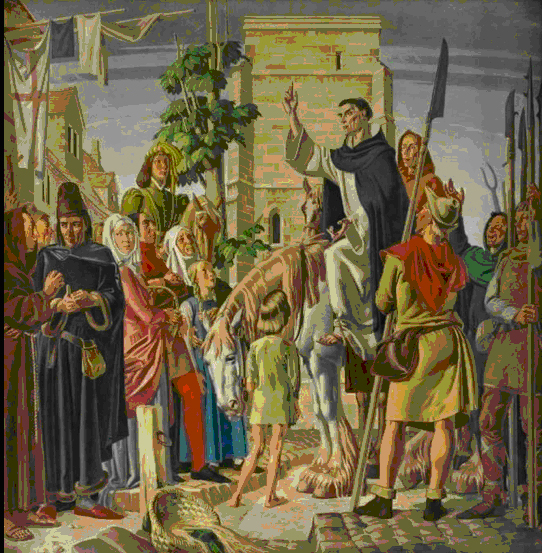 Bernard Fleetwood-Walker, John Ball Preaching at Brentwood, 1381
Bernard Fleetwood-Walker, John Ball Preaching at Brentwood, 1381
Date painted: 1938, Oil on canvas, 370 x 380 cm,
Collection: Essex County Council
Then Wat Tyler and John Ball, burst into England’s Cathedral
And told Simon Sudbery, Archbishop of Canterbury,
“We’re here to depose you. We can talk to God directly.
We don’t need you as our overpaid intermediary.”
Ball sent messages in rhymed couplets to village after village,
Each urging insurrection: “John Ball greeteth you all.
Understand he hath rung your bell. Come with right and might,
And will and skill and free yourselves from your hell.”
He asked them to cast off the fetters that tied them to the soil:
To free themselves from landowners who were the earth’s traitors
Because, if the land belonged to anyone, it should simply be
The collective property of its cultivators.
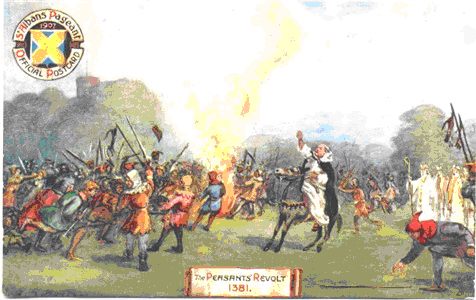 The Peasants’ Revolt and the men of St Albans, 1381. John Ball the Preacher
The Peasants’ Revolt and the men of St Albans, 1381. John Ball the Preacher
John Ball addressed himself to “Piers Plowman” and to “John Trueman”,
Meaning to honest men with some strength of mind,
And he invited them all to join him and “to chastise Hobbe the Robber”,
By which he meant state officials and their kind.
“Now is the time!” John Ball declared from village greens;
He knew the conditions for an uprising were ripe.
“The people are in such a plight that they can give no more.”
A contemporary chronicler would write –
Adding, “I suspect that if they had a leader they would revolt” [13]
Tyler stepped forward to save people from their misery
He and Ball determined to catch that tide in the affairs of men
“Which, taken at its flood, leads to victory.”
“Stand manlike together in truth”, Ball said, “and help truth
And truth shall help you.”
He urged audacity since, in his words, England’s government
“Held every vice to be a virtue.”
And protestors were arrested, or as John Ball put it,
“Truth hath been set under lock”
The church too, he said, was filled with corrupt sheep,
“And falseness reigneth in every flock.”
But because the Black Death had reduced the population by a half
And because labor was now at a premium,
Landlords were demanding even more backbreaking work
To make up for low levels of production.
And if any tied laborers bridled at their harsh treatment
They could be summoned by government scriveners;
Imprisoned either for breaking the Statute or for evading the Poll Tax,
Either way they ended up as political prisoners.
Those understandably refusing to work for the same wage paid
Before the Black Death’s depopulation of England
Were marked on the forehead with the letter ‘F’ for Falsity.
It was burned deep into the flesh with a brand. [14]
On 10 June Joan Hampcok and Agnes Jekyn spoke out
Against the lives which employers tried to take,
Only to be “fettered and manacled” in Canterbury castle
Until Tyler and Ball were able to stage a jailbreak.
http://www.hrp.org.uk/TowerOfLondon/stories/Fortressquiz
On June 16, in Cambridge a woman named Margery Starre
Denounced poll tax demands as the “devils’ works”.
She seized them, burnt them, then tossed their ashes to the wind
Crying, “Away with the learning of clerks!” [15]
Because, thanks to the “learning of clerks”, they had their lives
Signed, sealed and delivered, and they’d look askance
At hard-won cash being seized by armed agents of a remote King
Who’d use it for fighting his fruitless wars with France.
When the rebels invaded the houses of great landowners
The first place they went for was the muniment room,
Filled with the deeds and documents relating to their serfdom –
Papers and parchment fell victim to the rebels’ new broom.
The rebels gathered more followers and overran the Tower of London,
Freeing prisoners from dungeons and from chains;
They found the King’s Treasurer, Sir Robert Hales,
clutching His coffers, and relieved him of his ill-gotten gains.
It was the King’s uncle, John of Gaunt, who’d imposed the first Poll Tax
To pay for the Hundred Years War with the poor’s pennies and pounds,
But the tax would also benefit Gaunt (worth £110 billion in today’s money),
So the rebels burnt his Savoy Palace to the ground.
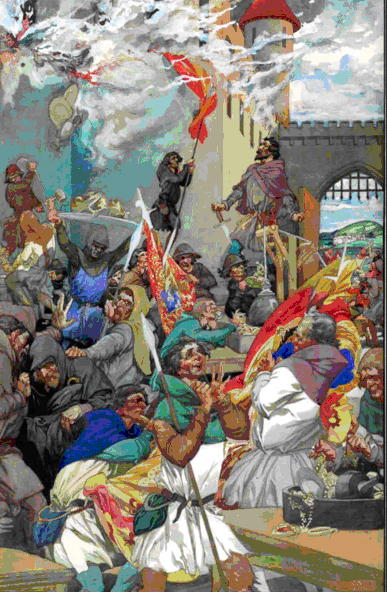 illustration: Alfred Garth Jones, The Peasants burn the Palace of the Savoy
illustration: Alfred Garth Jones, The Peasants burn the Palace of the Savoy
Gaunt’s Palace was built with the proceeds of the plunder
That he’d carried out in Poitiers and Crécy.
He spent £35,000 on it – then the equivalent of a third
Of the wages bill for the entire English army. [16]
Records from the court of King’s Bench show that this raid
Was led by a woman, Johanna Ferrour;
She was named as the “chief perpetrator and leader”, [17]
Riding on horseback with improvised armor.
John of Gaunt was away but his stuffed jerkin was made a target,
To be filled with arrows by Johanna and the rebel crowd.
Then Joanna uncovered a treasure chest filled with coins;
With a sovereign per person, she saw it equally shared.
Barrels of gunpowder Gaunt kept there were ignited
And London’s most lavish building was left in ruins.
Burning for a week, Johanna’s smoking rubble would point
To the transience of a rich man’s power and influence.
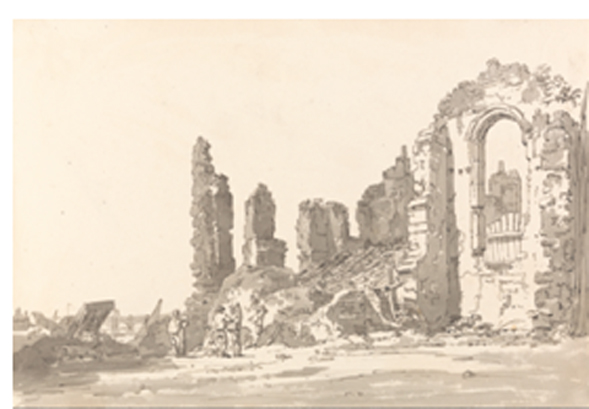 Thomas Girtin, The ruins of Savoy Palace
Thomas Girtin, The ruins of Savoy Palace
After Newgate Gaol was stormed and prisoners were released,
The Fleet prison’s governor was pricked with a sabre,
Followed by the Lord Chancellor and the Inns of Court lawyers
Whose privileges rested on taxes and forced labor.
Bundles of documents that legitimized the serfs’ shackles
By couching them in legalese were seized, and liberated
From frightened lawyers scuttling like rats in the Temple chambers.
Their papers were hurled onto bonfires then incinerated.
The Chief Justice, John Cavendish, tried to escape by boat
But he was spotted by three women: Katherine Gamen,
Margaret Wryghte and Margaret Drynkenaare who dispensed
Their own rough justice when they caught him. [18]
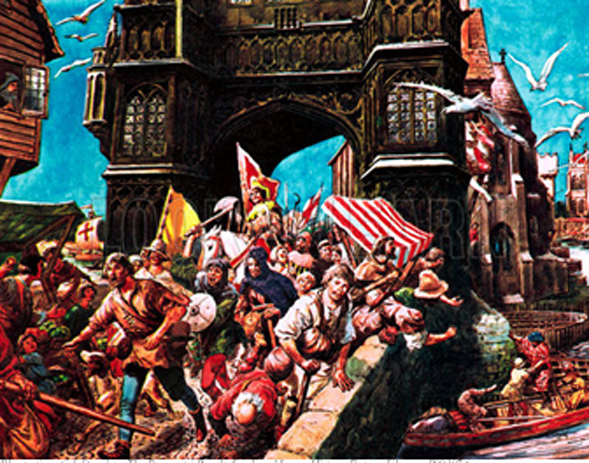 Illustration: C L Doughty, The Peasants’ Revolt /Look and Learn History Picture Library, B001074
Illustration: C L Doughty, The Peasants’ Revolt /Look and Learn History Picture Library, B001074
The King’s Bench Prison was sprung and Richard Imworth, [19] its keeper,
Fled to Westminster Abbey for sanctuary,
But, being known as “a tormentor without pity”, this was ignored.
He was dragged out and made to pay in the mortuary.
Lambeth Palace was targeted, then the Marshalsea Prison,
Which held yet more victims of the draconian Statute.
It was emptied so those within could join the Peasant Army
In its aim to defeat all those prosecuting the destitute.
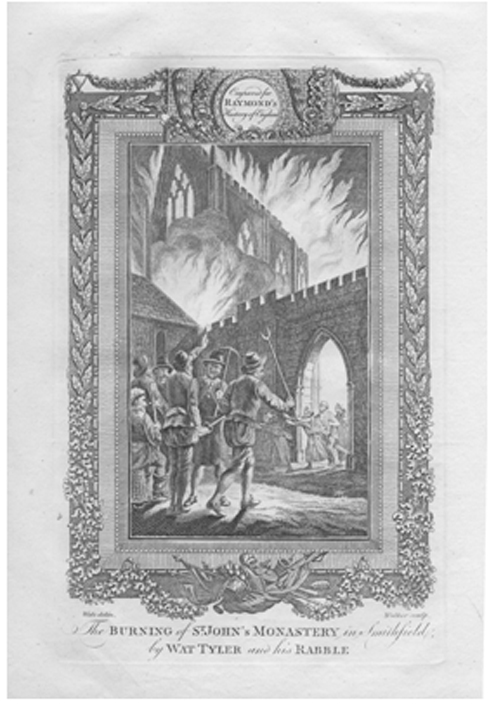
From a turret in the Tower the King could see the rebel army
And hear the gale-force murmurings of its multitude;
The flames and plumes of smoke which punctuated every horizon
Gave an indication of the crowd’s hostile attitude.
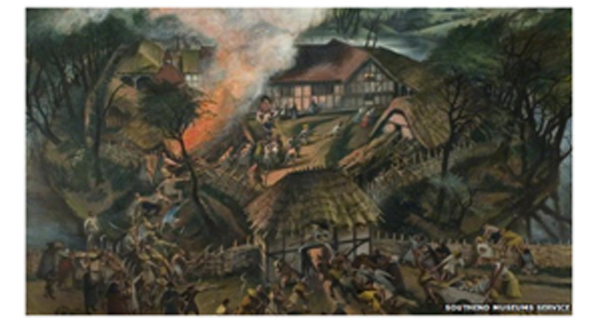 Panicked, the Earl of Salisbury said to the Royal Council,
Panicked, the Earl of Salisbury said to the Royal Council,
“If the rebels are successful then it will be all over
With us and our heirs, and England will be a desert.” [20]
(Meaning that only his class should live in clover).

On June 14th, the King agreed to meet Tyler at Mile End
And was persuaded to accede to the people’s demands:
That feudal service be abolished, along with market monopolies,
And that Bishops give up their power and their lands.
According to Adam of Usk, a chronicler of the time,
Tyler demanded “the liberation of all prisoners” –
Believing that Tax Commissioners, who locked people up for debt,
Were no more than extortionate swindlers.
“No man should serve another man”, Tyler said,
“But by his own free will.”
The rebels now described themselves as the ‘True Commons’
And were forming revolutionary councils,
Which, through open-air debate, worked out their demands
And after shows of hands settled on a Charter,
To spell out for the monarchist mafia ranged against them
Precisely what it was that they were after.
John Ball explained his socio-economic theory
Plainly enough for anyone to understand:
“The lords’ claim to be more lords than we are rests only on their power
To force us to labour that they may spend.”
The feudal lords had fine wines and good food, he explained,
Thanks to the surplus value produced by their serfs.
The lords then protected their property by law and by force
So they felt like giants and made others like dwarfs.
The next day the King met the rebels again at Smithfield
(Now scared his whole kingdom would be demolished),
For Tyler demanded all Englishmen be treated equally,
And that every aristocratic title should be abolished. 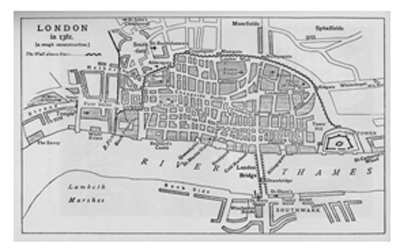
Smithfield in those days was a large open space lying
Between Holborn River and Faggleswell Brook;
St. Barts Hospital and the Charterhouse, its other borders,
Held a truculent crowd with a purposeful look.
 Maidstone Museum & Bentlif Art Gallery
Maidstone Museum & Bentlif Art Gallery
Wat Tyler was wearing a thick woolen hood on his head
Which he kept on, rather than showing deference;
Tyler gave no sign that he was overawed by the King,
Nor by the crown which was the King’s preference.
An eye-witness, the writer John Gower, noted that Tyler
Had a nickname, the crowd called him the Jackdaw.
“So the Jackdaw stirred up all the others with his outrageous shouting,
And he drew the people’s minds towards war.” [21]
Tyler was supported by Ball at his side in his monk’s garb
Who personally warned the king that “matters
Cannot go well in England until all things shall be in common.” [22]
The King’s advisers saw their system in tatters –
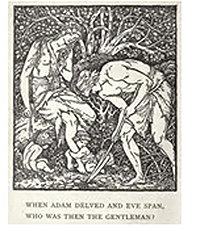 Particularly when the crowd took up John Ball’s chant,
Particularly when the crowd took up John Ball’s chant,
“When Adam delved and Eve span,
Who was then the gentleman?” [23]
And was being swayed by the priest’s stirring rants:
“There are those in England who are treated as beasts
While others idle in velvet, but by whose leave?
Why should they be more masters than we are of ourselves?
Aren’t we descended from the same parents – Adam and Eve?”
“Much the worse shall it be for the lords of this realm,”
Tyler added, “if this charter be refused.” [24]
He described a vision of England with self-governing communes
And with no one in the land or city being ill used.
“No lord shall exercise lordship over the people
And, as we are oppressed by so vast a hoard
Of bishops and clerks, the property of the holy church
Should be taken and divided.” [25]
If there was to be no end to serfdom, then those benefiting
From a callous feudal system would be attacked,
And furthermore, they insisted, no man be compelled to work
Except with a fairly agreed labor contract.
“How ill they behave to us. For what reason?” Ball asked,
“For what reasons do they hold us in bondage?”
But at this moment the Lord Mayor of London, William Walford,
An influential member of the King’s entourage,
Stepped forward to advise the King, and Walworth saw no reason
Why any concessions should be made.
Walworth was benefiting from making loans to the Crown for wars
(He was laying the City of London’s foundations),
And William Walworth and his tax-collecting cronies
Would blackmail the government of the day:
‘Do what we want or we sit on tax money and war loans.
You’ll be bankrupt and the army will mutiny.’
Though Parliament had complained about this gang of plutocrats,
Walworth, now war treasurer, and his friends conspired
To keep food prices up and they persuaded the King to issue Edicts,
That gave them the monopolies and the profits they desired.
But Tyler’s ideas for fair shares were alien to Walworth –
Blasphemy to this courtier, brothel-keeper and money-grubber ,
Who, when he saw the King shake hands with a “shoeless ruffian”, [26]
ly saw red and leapt at Tyler with his dagger.
Like a coward, Mayor Walworth attacked Tyler from behind,
Stabbing him in the neck with his blade.
Walworth set a pattern for the City of London’s robber barons:
Self-serving cutthroats who work in the shade.
Betrayed, the participants in the great rising returned home,
Only for the King to renege on his every concession,
Then send out troops to round up five hundred farm laborers,
Grouping them together on a mass gallows as a lesson.
At Smithfield the King had given his word to Wat Tyler:
“All that you have asked for I promise readily,
And now let the people return for their requests have been granted.” [27]
But they would soon learn about royal hypocrisy.
Tyler and the King had first of all met one to one,
But then courtiers and guards gathered round
So it was hard for the crowd to see what was happening,
And they couldn’t see Tyler fall to the ground.
For fear of the crowd’s reaction, the King then deceived them.
He’d conceal that Tyler’s life had now ended:
“Tyler has been knighted,” he called, “Your demands have been granted.” [28]
fact Walworth was having Tyler’s body beheaded.
The King then instructed Walworth “to protect the City.
You are to punish everyone who makes riots against our peace.
Either according to the law or by beheading and the mutilation of limbs,
As seems to you most expeditious and sensible.” [29]
And all the “charters for the remission of servitude” that he’d earlier signed
The treacherous King announced that he’d cancelled –
The King’s idea of utopia was of him alone on his throne
While the rest of the population cravenly groveled.
On a tour of Essex the King sneered at his forlorn subjects
(Though as a Christian they were supposed to be his brothers):
“Rustics you were and rustics you are still. You will remain in bondage,
Not as before, but incomparably tougher.”

* * *
continued…
https://internationaltimes.it/the-red-dagger-part-two/

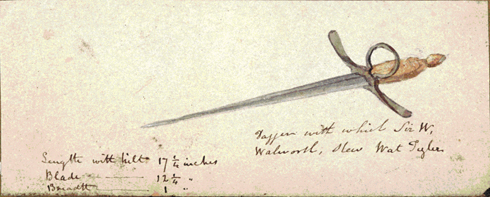
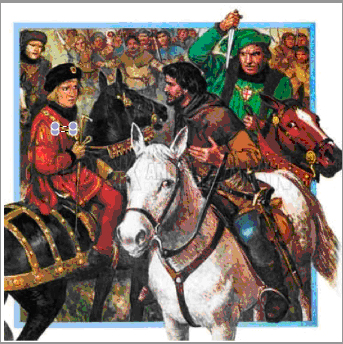
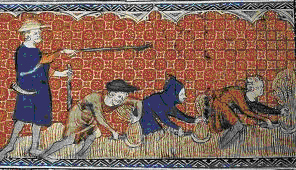
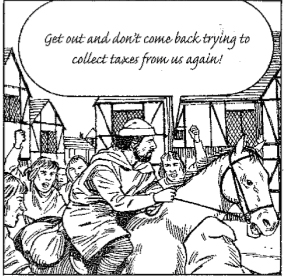
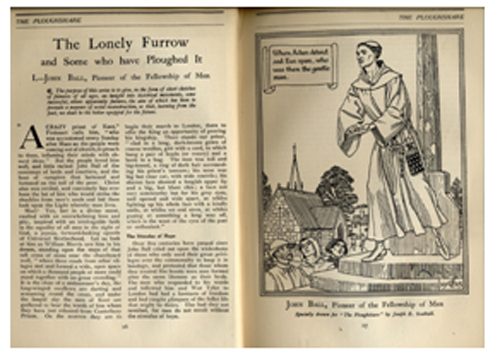
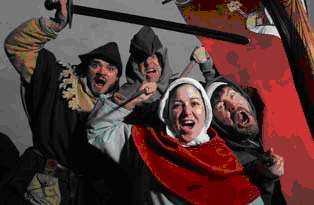
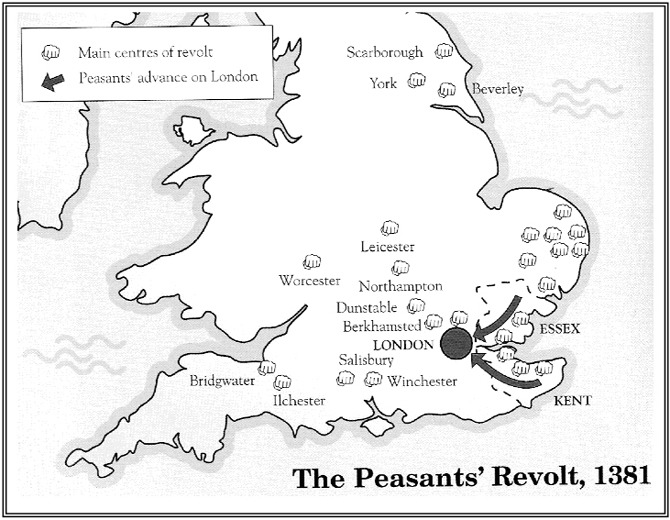
Well done Heathcote – a masterly reigniting of a famous episode and the still unfinished cause which it spurred into life
Comment by Julian on 29 December, 2013 at 11:02 am[…] A coat of arms which, incidentally, gloats the death of the great Wat Tyler who was butchered to death in St Bartholomew’s Church by including (top left of shield) the dagger he was killed with by a man called Wallworth. […]
Pingback by A TALE OF TWO CITIES: - RogueMale on 27 September, 2014 at 8:23 pm